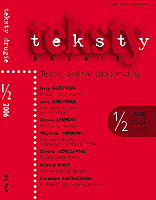Rousseau, Diderot i narodzin autentyczności
Rousseau, Diderot, and the birth of authenticity
Author(s): Michał WarchalaSubject(s): Philosophy
Published by: Instytut Badań Literackich Polskiej Akademii Nauk
Keywords: Authenticity; Rousseau; Diderot; Philosophy; History of thought
Summary/Abstract: This essay attempts at analysing the notion or concept of authenticity (approached as a moral postulate) in Jean-Jacques Rousseau’s works. The basic subject of analysis includes: the Lettre á d’Alembert sur les Spectacles (Letter to Alembert on the Theater); Les Confessions (The Confessions); and, Les Rêveries du Promeneur Solitaire (Reveries of the Solitary Walker). These are treated as parts of a peculiar ‘monologue’ in which Rousseau endeavours to present himself to the reading audiences, seeks to find his ‘self proper’, associable with the notion of ‘nature’. The tools used include, at first, a critique of theatre and mask, then, a subjective attempt at describing his own life, and, finally, an intimate meditation. Partly inspired by a deconstructionist analysis, the Author argues that all three attempts end up in a failure: a triumph of mask (Letter…, The Confessions), a loss of subjectivity and the ‘self’ getting melted in a mechanistic order of nature (Reveries…). This is indicative of certain aporiae occurring within the very notion of ‘authentic self’; in order to emphasise them even stronger, Rousseau’s texts are juxtaposed with Diderot’s Rameau’s Nephew, an ironical description of subjectivity to which theatricality and guise is the proper element. The essay is part of a larger work devoted to the history of the notion of authenticity in modern thought.
Journal: Teksty Drugie
- Issue Year: 2006
- Issue No: 1-2
- Page Range: 205-224
- Page Count: 20
- Language: Polish

